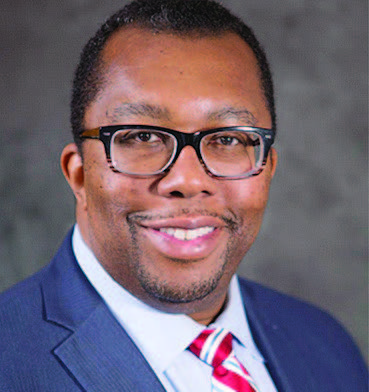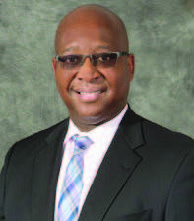
African Americans making power moves in corporate world
by Rob Taylor Jr.
Courier Staff Writer
Andrea Stanford was already going places, even before The Advanced Leadership Initiative’s “Executive Leadership Academy” came to fruition in 2018.
The Westchester County, N.Y., native, who came to Pittsburgh and graduated from the university that bears the city’s name, has been lauded for her professional and community service efforts in the 13 years she’s been in the Steel City.
In recent years, she progressed from a Digital Experience Product Manager at PNC to Assistant County Manager for Allegheny County.
Then came word of a new program specifically targeting African Americans to help propel them into executive-level positions in Pittsburgh-area companies—the Executive Leadership Academy. The first cohort of 23 members graduated in late 2019 after weekend sessions totaling seven months, taught at Carnegie Mellon University’s renowned Tepper School of Business.
The next cohort of 28 members was announced in January 2020, and included in that cohort was—you guessed it—Stanford.
Today, Stanford is the vice president and Pittsburgh regional manager for BNY Mellon.
Stanford’s tireless drive, combined with the connections, coaching, mentoring and instruction supplied at TALI’s Executive Leadership Academy, is precisely what Evan Frazier hoped for when he created the idea of the Academy—getting more Blacks into C-Suite level positions in the region’s companies.
“Andrea’s amazing,” Frazier told the New Pittsburgh Courier. “I’m quite sure, if you ask her, she will let you know that TALI was very instrumental in building relationships and giving her visibility that allowed her to get promoted in that way.”

ANDREA STANFORD recently became the vice president and Pittsburgh regional manager for BNY Mellon. She was part of the most recent graduating cohort of the Executive Leadership Academy, a program that aims to prepare African Americans for executive-level positions. (Photo courtesy Next Pittsburgh/Becky Thurner Photography)
The Richard King Mellon Foundation loves the program, too—so much so that the foundation on Dec. 17 provided TALI with a $1 million grant to continue and expand its programs.
“Supporting Black leadership has been an ongoing focus for us,” said Richard King Mellon Foundation Director Sam Reiman, in a statement. “That’s why we seeded TALI with its first six-figure grant in 2018. And now, we are making an even larger grant…in hopes that TALI can seize this remarkable societal moment to generate even greater private-sector enthusiasm for its important work. TALI has enjoyed noteworthy support already, from corporate leaders such as BNY Mellon, Highmark, PNC and UPMC. But even more private-sector partners are essential for this ambitious initiative to achieve its full potential.”
“It has always been our vision, from day one, to create a self-sustaining institute that will provide longevity for TALI and its mission,” Frazier said in a statement. “This grant will be transformational, enabling TALI to build on early local success while expanding reach and impact through expanded areas of focus and a new national footprint. We are truly grateful to the Richard King Mellon Foundation for this grant and their strategic investments in TALI at critical times over the years.”
Frazier, who’s also the senior vice president of community affairs at Highmark Health, said that the coronavirus couldn’t stop the instruction for the second cohort. Much of the instruction was done online, and the graduation was held in November, also virtually.

MICHAEL D. THOMAS, a member of the Executive Leadership Academy’s first cohort, recently became PNC’s executive vice president, real estate.
So far, 51 African Americans have graduated from the Executive Leadership Academy. The third cohort of 28 African Americans has already been selected and will be announced in January 2021. Most of the members of the Academy are financially sponsored by the company in which the individual is employed, as Frazier said it’s important that local companies, especially the larger ones, are committed to investing in its African American talent.
The $1 million grant from the Richard King Mellon Foundation will be primarily used to turn The Advanced Leadership Initiative into The Advanced Leadership “Institute,” Frazier told the Courier. He said now’s the time to cement TALI into the Pittsburgh community: building up and formalizing the Academy’s alumni structure, which will “create the notion of lifelong support and learning and engagement” with the alumni for years to come; creating an “Emerging Leadership Program” featuring African Americans who want to be in the Executive Leadership Academy, but may not have enough years of professional work experience or aren’t at the desired managerial level in their present employment; and wanting to impact African American executive leadership development at the national level.
TALI’s future ambitions can’t be achieved by having just one full-time staff member, Frazier said. The grant will help to add staff, as TALI currently has Robert Young, managing director, as its lone full-time staffer.
Frazier said TALI, which currently uses the POISE Foundation as its fiscal sponsor, will officially become an independent nonprofit organization by the summer of 2021 and use the name, The Advanced Leadership Institute, Inc.
For Frazier, hearing about African Americans advancing to high positions in local companies is music to his ears. During an interview with the Courier, Dec. 17, he gloated not only about Stanford’s success, but the success of Michael D. Thomas, a member of the first cohort in 2019. Thomas attained a new job this year with PNC as its executive vice president, real estate.
And don’t forget about Jeff Davis, a member of the second cohort this year, who recently became a senior vice president in corporate communications at PNC.

JEFF DAVIS, a member of the Executive Leadership Academy’s second cohort, recently became PNC’s senior vice president in corporate communications.
“Each year, we’re just really pleased that there’s been interest from candidates and companies that want to invest in their talent,” Frazier said.
About 60 people apply for each cohort, Frazier added. “It’s a competitive program.”
But in the Academy’s infancy, Frazier admitted he wasn’t certain it would be a yearly success. He said he was questioned early on if Pittsburgh had enough African Americans in mid-level positions to keep the program going. “But you started to break it down, and you said, ‘How many companies are there in Pittsburgh? There’s hundreds and thousands,” Frazier told the Courier. “Even if you took the big companies, top 100, you mean to tell me a third of them, or a quarter of them, don’t have one Black person they can invest in, in an annual basis?”
That’s when Frazier and his supporters realized, “there’s plenty of people here” in Pittsburgh.
And the $1 million commitment from the Richard King Mellon Foundation, Frazier said, gives TALI the financial backing it needs to have an everlasting imprint on Pittsburgh’s African American community, primarily by diversifying the region’s executive-level members.
“This has the seeds that can grow into a strong institution that supports the advancement of African Americans in ways that few have done in the past,” said Greg Spencer, founding board co-chair of The Advanced Leadership Initiative and president and CEO of Randall Industries, in a statement.
“The future of TALI and all that it stands for has been strengthened, with this sizable grant,” said Marsha Jones, TALI advisory board co-chair and executive vice president and chief diversity officer at PNC, in a statement. “We are very encouraged by the support that we are receiving from R. K. Mellon, as we move forward toward securing our long-range mission.”
Appeared in New Pittsburgh Courier
Sorry, the comment form is closed at this time.
